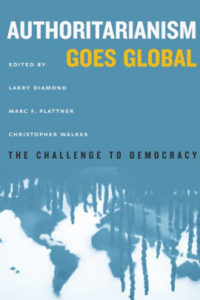 The list is grim: a draconian crackdown in Nicaragua; bloody repression in Myanmar; a tightening grip by Beijing on Hong Kong. The backsliding of democracy, though, goes back far before 2021, with a long string of countries where democratic rule has been abandoned or dialed back, or where democratically elected leaders make no secret of their authoritarianism, Associated Press reports.
The list is grim: a draconian crackdown in Nicaragua; bloody repression in Myanmar; a tightening grip by Beijing on Hong Kong. The backsliding of democracy, though, goes back far before 2021, with a long string of countries where democratic rule has been abandoned or dialed back, or where democratically elected leaders make no secret of their authoritarianism, Associated Press reports.
2020 was “another year of decline for liberal democracy,” according to a recent report from the V-Dem Institute, a Sweden-based research center. “The world is still more democratic than it was in the 1970s and 1980s, but the global decline in liberal democracy has been steep during the past 10 years.”
“We had the largest number of democracies that ever existed in the world,” said Barnard College professor Sheri Berman, a contributor to the National Endowment for Democracy’s Journal of Democracy. But then the cracks began to show. “It takes a lot to make democracy work.” Read the rest.
Authoritarianism reinvented: it’s gone digital
The fact is that the global democratic decline of the past 15 years has coincided with autocratic leaders and governments capitalizing on digitization. They’ve learned that regime survival can depend on their capacity to deploy and weaponize such technologies against their own citizens, notes Marie Lamensch, the project coordinator at the Montreal Institute for Genocide and Human Rights Studies at Concordia University.
 Indeed, now defined as “the use of digital information technology by authoritarian regimes to surveil, repress, and manipulate domestic and foreign populations,” digital authoritarianism is rapidly entering the vocabulary of foreign affairs practitioners and researchers as a new global force of disruption, she writes for CGIOnline:
Indeed, now defined as “the use of digital information technology by authoritarian regimes to surveil, repress, and manipulate domestic and foreign populations,” digital authoritarianism is rapidly entering the vocabulary of foreign affairs practitioners and researchers as a new global force of disruption, she writes for CGIOnline:
Authoritarian regimes have the capacity to silence their citizens in the diaspora through digital threats, coercion by proxy and spyware, as Freedom House revealed in its Out of Sight, Not Out of Reach report….. For Alina Polyakova and Chris Meserole, “Beijing’s experience using digital tools for domestic censorship and surveillance has made it the supplier of choice for illiberal regimes.” … Similarly, a report by the Australian Strategic Policy Institute argues that China serves as a model of digital authoritarianism ….Yet, according to Carnegie analyst Steven Feldstein, while China may be a primary supplier of surveillance technologies, there is no evidence of a grand intentional strategy to “systematically proliferate digital authoritarian tools.”







